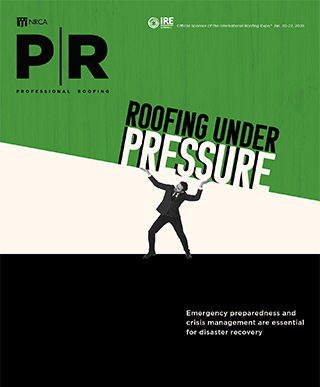Roofing is one of the oldest trades in the world, and the industry’s traditions are strong and often unique. For hundreds of years, roofing professionals have passed traditions, knowledge and essential skills from one generation to the next.
One intergenerational tradition practiced by some roofing contractors is family succession of their businesses.
There currently are more than 81,000 roofing contracting companies in the U.S., according to research organization IBISWorld. When a company leader decides it’s time to step back, who steps up?
For some, the question needn’t be asked because succession planning has been underway for years. For others, such a decision kicks off a search for the best candidate. But for company leaders who decide to pursue family succession, it’s all about ensuring the next generation’s success.
What is family succession?
Family succession refers to the transfer of assets and duties to a family member when an individual retires, becomes ill or dies. Family succession planning in business follows many of the same processes as nonfamilial succession planning, such as identifying business needs, training successors and documenting the transition.
But family succession planning also requires intergenerational teamwork and mutual understanding. Participants must be able to communicate openly, work together to resolve conflicts, and maintain important company and family values throughout the process.
Professional Roofing reached out to roofing contractors to learn what’s working for families carrying out this tradition.When to begin
How do business leaders determine the best time to begin family succession planning? For some successors, it’s less important to establish a formal timeline and more about stepping up within their companies when the timing feels right.
Michael Beldon, chairman of Beldon® Group of Companies, San Antonio, gradually took over the company that his parents, Morry and Ann, founded in 1946.
“It was less of a planned or timed transition and centered more on when I started making the big decisions for the company,” Michael Beldon says.
Although it was long understood Michael Beldon’s son, Brad, eventually would take over the company, no specific time frame was set for that transition, either.
“We did not have—nor do we today have—a formal transition plan for the family,” explains Brad Beldon, chief culture officer and CEO of Beldon Group of Companies. “In each instance, both my father and I stepped in and assumed the necessary responsibilities to carry the torch to the next generation.”
Other companies choose to enact long-term succession plans to minimize disruptions and maximize the potential for success, as well as impart necessary skills and values to successors.
RJ Radobenko, president and CEO of Global Roofing Group, Phoenix, assumed his leadership position in July 2022.
“My father, Rick, turns 70 this year, and we have been planning for his succession for 10 years,” Radobenko says. “My father’s mentoring kicked into high gear after my promotion to president in 2014. I have learned many critical thinking and analytical strategies from him, as well as humility, positivity and gratitude.”
Family succession planning also can begin once a younger family member commits to pursuing a career in the family business.
Sherri Miles, president of Miles Roofing Inc., Chesapeake, Va., worked for a law firm after college and then at L.E. Schwartz & Son Inc., Macon, Ga., before joining her family’s roofing business.
“After I started working for our company and knew I would stay, my family started having conversations about ownership,” Miles says. “Because the transition was gradual, there was plenty of time for my dad to hand over more responsibilities to me seamlessly. He and I still share an office, and I’ve learned a great deal of his style and thought process just by listening.”
Kelly Van Winkle, president and CEO of King of Texas Roofing Co. LP, Grand Prairie, owned an industrial tool supply company for seven years before switching to commercial roofing. Her decision to join King of Texas Roofing in 2011 kept the business in her family.
“Because I decided to close my company in June 2011 and join our family’s business in October 2011, there wasn’t much time to design a grand plan for the transition,” Van Winkle explains. “We molded a plan as the years passed, and I ramped up my duties over time as I learned more aspects of the business. In 2019, I moved into the president role, and my father, Nelson, transitioned from president to vice president and founder. The length of time I had to work side by side with him proved advantageous.”
Family dynamics and company needs ultimately influence the timing of family succession planning. Maintaining open communication among all people involved is key to ensuring success.

|
DID YOU KNOW?
Fred Good served as NRCA’s executive vice president (now called CEO) from 1957-1989, and his son Bill Good filled the role and served from 1989-2016.
Strength in numbers
Family members who are in business together are uniquely positioned to take advantage of several benefits, including having a built-in support system of people who innately understand each other, endless mentoring opportunities and long-standing customer relationships. Family succession planning in business often involves all these elements.
Family members already know each other’s strengths and weaknesses and can apply this knowledge advantageously. Members of an older generation may even encourage members of a younger generation to develop specific skills to benefit the company.
“In our family business, we have found working in multiple departments is the best approach,” Brad Beldon says. “Furthermore, knowing accounting was not my best strength, I encouraged each of my kids to get a finance degree. My son, Marshall, went a step further and earned a master’s degree in professional accounting. Now, he is teaching me numbers!”
Brad’s father also recognizes his family’s assets.
“Family members bring different strengths,” Michael Beldon says. “Brad is more technical, and Marshall has a financial background. But the important thing is everyone is willing to work hard.”
Ongoing mentoring between a leader and a successor—often a parent and an adult child in the case of family succession—can help ensure a smooth transition.
“The most productive and helpful thing my father and I did regularly was to have brief, in-person meetings or phone calls,” Van Winkle explains. “Frequent and open dialogue was the easiest way to problem-solve and stay on top of any concerns or challenges. He is now moving to more of a founder role, but we continue to maintain this practice.”
Family members also may be more frank and honest with each other compared with other company employees.
“My father and I always have had an open relationship,” Brad Beldon says. “He is upfront and brutally honest with me, whether I want to hear it or not. He is usually right 99% of the time, but every now and then, he is off target. I appreciate the fact he does not sugarcoat anything. It makes me a better leader and a better person.”
In addition to demonstrating how to handle everyday responsibilities, older family members may try to impress upon younger people the importance of maintaining long-standing customer relationships. If a family business has been operational for several generations, it’s possible some customer relationships could span decades. Such customers likely will expect the best from a company they have supported for many years.
“My company has been around for 112 years,” Miles says. “Our longevity gives us a selling advantage: There is a trust factor already built in. In our community, there is a sense of pride for our employees, as well. They know we care about them, our clients and the buildings that have our roofs on them.”
Families can rely on their values and hard work to maintain strong customer relationships.
“It’s a great honor and responsibility to have a generational family business,” says Steven Kruger, president of L.E. Schwartz & Son. “You work hard to earn and keep everyone’s respect. A strong value system is extremely important.”
Maintaining a company culture that prioritizes excellence also goes a long way toward customer satisfaction.
“Companies evolve over time and each of us, including my father and grandfather, had to adjust to the times,” Brad Beldon says. “What has stayed consistent is our approach to continuous improvement. We approach each day with a morning huddle where we discuss what we did right yesterday, what we could improve upon and how we will do so tomorrow.”
Families in business together are wise to take advantage of these and all other benefits during the succession process.
Next gen
Two-thirds of U.S. family businesses have next-generation family members working in the business, according to a 2020 survey conducted by business advisory company PwC. Does that mean younger family members know early on they want to be involved in the family business? Not necessarily.
“I did not think I had a place in the family business during and after my time in college. I worked for a law firm in Washington, D.C., and thought I would go to law school,” Miles says. “Eventually, I started working at L.E. Schwartz & Son. They put me through an internship in all their departments, and I learned a ton. I came back home with much more confidence, and decided I like roofing!”
For members of an older generation, it’s important to limit pressure and expectations placed on younger family members. Some find it’s more effective to teach their children about the company and encourage some involvement so each individual can naturally gauge his or her interest.
“It would be an honor for me if my son or daughter were interested in the family business,” Radobenko says. “However, I do not plan on putting any pressure on my kids to join the family organization. I want them to figure out their own lives. I plan on continuing to educate them about the family business but want them to choose their own destiny. I will support them any direction they choose.”
Parents whose children choose to become their successors may experience mixed emotions. Some are thrilled their son or daughter will lead the company into the future. Others may be happy but also struggle to let go of their own role after devoting so much time and effort to the business.
“I think it’s always difficult for the founder of a company, like my father, to give it up and let someone else start making decisions. It’s easier for someone who takes over the company from the founder to pass the company to the next person,” Michael Beldon says. “I was always hopeful Brad would take over the company from me. The transition between us was natural.”
When the next generation does join in, it brings fresh perspectives and ideas that are recognized and appreciated by the family.
“It makes me proud Kelly is the third generation in the industry,” says Nelson Braddy, founder of King of Texas Roofing. “It was comforting to know the company I built for almost 40 years would be in the hands of my daughter.
“She brings a whole new perspective to our business. Her involvement forces our entire company to consider new ideas and redirect focus on what’s important. She has been able to identify problem areas that, quite frankly, I knew existed but never dealt with or corrected.”
The next generation also may be able to offer new insight to tackle ongoing company or industry challenges.
“Each generation has succeeded by building on the past and evolving the business to face the current challenges being presented to our company,” Kruger says. “My son, Michael, brings a unique perspective of seeing what has brought us to this time and encompassing the ability to integrate technology upgrades for the future. He also understands the evolving workforce challenges we face.”
“The younger generation brings new ways of seeing the same old problems,” Miles says. “The next generation has some big issues to wrangle with, and it’s up to us to set a framework for them to work within. Then, it is our job to get out of their way!”
When older and younger family members work together to embrace change, the future of the roofing industry is exciting for all.
“The younger generation brings robotics and technology as strengths to the current roofing business models,” Radobenko says. “I predict we will see more technology and innovation in machines and materials during the next five years than we have had in the past 20 years.”
Lasting legacy
Not all family businesses are created equal, and despite best efforts, some family businesses don’t survive or are forced to sell to outside investors. Family feuding, unqualified leadership and a lack of family succession planning all can lead to family business failure, according to smallbusinessify.com.
There is no clear data regarding how many U.S. family businesses make it through a second or third generation. One small 1980s study revealed about one-third of manufacturing companies surveyed made it through a second generation; 13% made it through a third generation; and only 3% made it through a fourth generation, according to Harvard Business Review.
But U.S. roofing contractors seem to be managing family succession particularly well. Beldon Group of Companies, L.E. Schwartz & Son and Miles Roofing each have welcomed or are preparing for a fifth generation of family members to join the businesses.
These thriving businesses and more are living proof successful family succession is highly achievable in an industry that has never shied away from hard work and tradition.
SARA VAUGHN is Professional Roofing's assistant editor and NRCA’s manager of communications.



